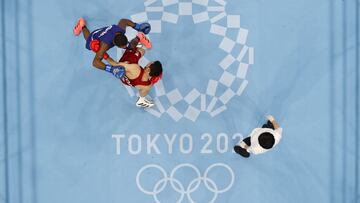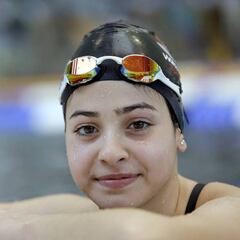What is the Refugee Olympic Team (EOR/ROT) and which athletes are competing in it?
The refugee team was first introduced for the 2016 Olympic Games in Rio de Janeiro and 29 displaced athletes will compete in Tokyo under the Olympic flag.


Earlier this year the International Olympic Committee (IOC) Executive Board announced that they would be significantly expanding the Refugee Olympic Team (ROT) for Tokyo 2020.
The IOC offers scholarships for promising refugee athletes from all around the world, with the very best able to compete for the team in the Olympic Games. The team’s official name is Equipe Olympique des Réfugiés (EOR).
"My Olympics journey should give hope to all young Afghan girls."
— Al Jazeera English (@AJEnglish) July 23, 2021
Meet Nigara Shaheen, who was born in Afghanistan but grew up in Pakistan, and will be part of the Refugee Olympic Team at #Tokyo2020 👉 https://t.co/WNQESZDAQx pic.twitter.com/DOFquqEpgA
To help with their training and preparation ahead of this year’s event, the athletes have been hosted by a number of counties: Australia, Austria, Belgium, Brazil, Canada, Croatia, Egypt, France, Germany, Israel, Jordan, Kenya, Luxembourg, Portugal, The Netherlands, New Zealand, Trinidad and Tobago, Turkey, Sweden, Switzerland and the United Kingdom.
What is the history of the Refugee Olympic Team?
In the long and illustrious history of the Olympic Games the ROT is a very new addition. Rescue.org reported that in 2015 65 million people were displaced from their homes due to conflict and natural disaster, with over one million entering Europe specifically due to wars in the Middle East, Africa and Central Asia.
Kimia Alizadeh is a true fighter 😤
— Refugee Olympic Team (@RefugeesOlympic) July 25, 2021
The Refugee Olympic Team member, who knocked out reigning Olympic champion Jade Jones, fell short just of the bronze medal in -57kg in Tokyo.
She proved she was a formidable opponent 👊#taekwondo #StrongerTogetherhttps://t.co/UPYjvNGr3y
To help support those who had lost their home, the IOC established a $1.9 million Refugee Emergency Fund later that year to integrate refugees into sport. As a consequence of that move, it was announced that the IOC would be inviting refugee athletes to compete under a unified banner at the 2016 Olympics in Rio de Janeiro.
For that first Games the ROT included ten athletes from the Democratic Republica of Congo, Ethiopia, South Sudan and Syria. Due to the success of that first competition, and the message of hope and inclusion it provided for millions watching around the world, the IOC decided to continue with the team for the 2020 Olympic Games in Tokyo.
Who will compete for the Refugee Olympic Team in 2020?
The ROT squad for the 2020 Games has grown to include 29 members, competing in 12 sports and hosted in 13 different countries. As was the case in 2016 the majority of them are drawn from the Refugee Athlete Scholarship programme, although four come from the International Judo Federation Refugee Project to compete in the mixed Judo team.
A picture of two brothers from #Syria — one representing the Olympic refugee team, the other the Syrian team — hugging during #Tokyo2020 #OpeningCeremony has gone viral @Tokyo2020 @Olympics https://t.co/k51uKiuiZi pic.twitter.com/Kx0YR8yVwc
— Arab News (@arabnews) July 25, 2021
Related stories
During the opening ceremony they marched under the Olympic flag and immediately behind Greece, the originators of the Olympics, who traditionally march in first position. At this year’s Games the 29 ROT athletes will compete in athletics, badminton, boxing, canoeing, cycling, judo, karate, taekwondo, shooting, swimming, weightlifting, and wrestling.
Here’s the full list of the 2020 Refugee Olympic Team athletes, along with their country of origin:
- Alaa Maso - Men’s Freestyle 50m swimming (Syria)
- Yusra Mardini - Women’s Butterfly 100m swimming (Syria)
- Dorian Keletala - Men’s 100m athletics (Congo)
- Rose Nathinke Likonyen - Women’s 800m athletics (South Sudan)
- James Nyang Chiengjiek - Men’s 800m athletics (South Sudan)
- Anjelina Nadai Lohalith - Women’s1500m athletics (South Sudan)
- Paulo Amotun Lokoro - Men’s 1500m athletics (South Sudan)
- Jamal Abdelmaj Eisa Mohammed - Men’s 5000m athletics (Sudan)
- Tachlowini Gabriyesos - Men’s Marathon (Eritrea)
- Aram Mahmoud - Men’s Badminton (Syria)
- Wessam Salamana - Men’s Lightweight boxing (Syria)
- Eldric Sella Rodriguez - Men’s Middleweight boxing (Venezuela)
- Saeid Fazoula - Men’s Kayak (K-1) 1000m (Iran)
- Masomah Ali Zada - Women’s Time trial cycling (Afghanistan)
- Ahmad Badreddin Wais - M Time trial cycling (Syria)
- Sanda Aldass - Women’s Judo (Syria)
- Ahmad Alikaj - Men’s Judo (Syria)
- Muna Dahouk Women’s Judo (Syria)
- Javad Mahjoub - Men’s Judo (Iran)
- Popole Misenga - Men’s Judo (DR Congo)
- Nigara Shaeen - Women’s Judo (Afghanistan)
- Wael Shueb - Men’s Karate (Syria)
- Hamoon Derafshipour - Men’s Karate (Iran)
- Luna Solomon - Women’s 10m air rifle shooting (Eritrea)
- Dina Pourounes Langeroudi - Women’s 49kg taekwondo (Iran)
- Kimia Alizadeh - Women’s 57kg taekwondo (Iran)
- Abdullah Sediqi - Men’s 68kg taekwondo (Afghanistan)
- Cyrille Fagat Tchatchet II - Men’s 96kg weightlifting (Cameroon)
- Aker Al Obaidi - Men’s 67kg wrestling (Iraq)
